Adam Ondra - a multi-pitch interview

 1 / 44
1 / 44 Vojtech Vrzba
Vojtech Vrzba
PITCH 1 - 2012 World Climbing Championships and competitions
So, Adam, here we are at the 2012 World Climbing Championships in Paris. Yesterday you had a rest day, in Fontainebleau: you just can't keep away from rocks, can you? How did it go?
Yes, we were in Fontainebleau (Editor's note: Adam and the rest of the Czech team) but I was just hanging around, my friends were climbing. It's definitely better to be among real rocks to get some motivation before a competition and to remind yourself that, after the event, you'll be able to go rock climbing again. And anyway it's certainly better than lying in your hotel bed... :-)
Given what you've just said, what are your feelings regarding competitions nowadays?
For me, rock climbing is not only about the challenge, but competitions are. Which I enjoy, but I can deal with only from time to time. And I also take competitions as a really good kick to motivate myself into proper hard training. When I came back from Norway this summer I knew I was a bit out of shape, but one month in the gym, which I took as preparation for these World Championships, is certainly also going to be useful for the project I want to finish.
So has this month of training paid off and put you in good shape? How was the semi-final today?
I finished the semi-final in fourth position, but I don't think I managed to give 100%. The route was quite easy, all the way to the top, and then there was a crux move which I managed to get through. But after that I made a little mistake with my feet and fell. I kind of missed the hold and I was already quite pumped. Had I stuck the move maybe I would have sent the route. I was pretty pumped but there was still some energy to spare.
In a competition, would you prefer to win without topping, or to top the final route but maybe end up second because of count back or time? In other words, is it more about the route or more about the other competitors?
I think that for every competitor the most important thing is the feeling that you've climbed at 100%, that you have put to good use all the previous training and sacrifice. The result is therefore secondary, but I must admit that it's very important, too. In the comps, whether I top out or not is not that important for me. From my point of view, it is better to have a winner falling at 3/4 height rather than having more than one top in the finals.
Following the example of last year's Rock Master in Arco, the World Championships are now hosting Paraclimbing. What do you make of this ?
I think these things are really positive. It's happening in so many other sports and it will definitely help climbing to get into the Olympics. For me, it's really inspiring that the Paraclimbers are so passionate about the activity and that despite being disabled, they still want to climb. What they do is really amazing. I remember how I met a guy with just one foot and he was climbing 7c in Kalymnos, it was so incredible. I can't even imagine how tired I would be just to get to the start of the route if I had that disability.
I imagine that you are looking forward to climbing being in the Olympics then?
Of course there are advantages and disadvantages, but it's a long story. I am sure there are more advantages than disadvantages but for sure we have to make it happen in the right way.
PITCH 2 - Summer 2012 and the start of your first year completely dedicated to climbing
With high school done, this is the first year that you can devote completely to climbing. Let's look back at the summer season so far, which started in Céüse. Are you still happy that you tried to flash Biographie or do you think you should have waited a bit longer?
In hindsight, I should have waited a bit longer, but at that point I was in Céüse and I couldn't resist. I was thinking about it all the time during my final high school exams... I wasn't in 100% shape, and I found out that flashing 9a+ is too big a deal for the time being…
And then came the granite in Scandinavia… Did you find it technical, hard to onsight?
It depended on the area. Flatanger (Norway) is harder to onsight compared to limestone in Spain, but still possible. But at Sweden's Granitgrottan for example it’s completely ridiculous, it's a vertical maze of holds, very strange holds too, you have to take these strange cubes and pinches, it's not obvious at all.
Regarding Flatanger, on your 8a.nu scorecard you wrote that the 3rd pitch of that project bolted by Magnus Midtbø (Thor's Hammer) is "impossible for now, but there are holds". What did you mean exactly?
That it's really hard! :-) I don’t think it's completely impossible but, in any case, the boulder problem is just way too high to make me motivated. If I decided to try and send the whole project in one go, it would be too boring to climb the first two pitches over and over again. There's basically an 8C boulder problem after 80 metres of climbing and it's just way too much. I am more motivated for my project called "Change", for example, it's much harder at the beginning and even though it's 55 metres, the last 20 metres are OK as you climb towards the lip of the cave.
Still on extreme projects, what can you tell us about the trailer of La Dura Dura, which came out recently on YouTube? Have you seen the final cut? What can we expect?
I haven't seen the final cut, no. You'll be able to see some good tries from Chris and me, but we didn't manage to send it…
How does it compare to the other hard lines in Oliana?
It's quite similar in style, in the sense that you climb 10 moves to get into the really hard boulder problem. It's that type of concept.
A bit like Chaxi Raxi (9b)?
Yes, but Chaxi Raxi is even more bouldery. I would describe La Dura Dura as a perfect example of pure power endurance. My project in Norway is a bit easier in the beginning compared to La Dura Dura but the second part is a bit harder.
And what about First Round First Minute in Margalef?
I tried it, I think Chris decided to grade it 9b in the end. It looked quite possible but you never know, I only tried it for one day.
Do you have any definite plans for the months to come?
I have definite plans for this autumn and winter this year. During the second half of winter I will just go to Spain. I'm not really certain where, I think I will just go around with the drill and dedicate time to whatever interests me, whatever inspires me to bolt work it.
PITCH 3 - It's not all about overhangs...
You are one of the very few young climbers who has also exceeded in what could be called "old school" climbing by today's standards: very compact rock and vertical or slightly overhanging faces. WoGü springs to mind, as do Tough Enough in Madagascar or your redpoint of Beat Kammerlander's Speed (8c+) in only 5 attempts at the age of 14. How do you relate to this type of climbing? Do you feel different when you climb these routes or do you have a different approach to them?
I've always wanted to be as universal as possible. This meant that when I went to try these routes, that type of climbing was not new to me, I was quite experienced in that terrain. So in the end I think that slightly overhanging or vertical type of climbing suits me even a bit better than, say, steep climbs like in the competitions. Of course, to climb hard in that style is very difficult because finding a hard route which is going to be climbable but not impossible is even rarer than finding that type of challenge on very overhanging rock.
Do you have plans for routes like Bain de Sang and Bimbaluna in Switzerland or for the Feltre area where Italian slab master Manolo has traced many of his latest hard routes?
At the moment I don't have any specific goals for repeating hard routes, I am more excited about finding my own. Whatever inspires me to go and bolt, I will make a project. Therefore I don't really have a specific routes or typse of route in mind. If I'm in those areas and like the look of some lines, then'll bolt and try to climb them. And if you want me to try to describe a perfect future project for me, something I'd love to spend a lot of time on, then it would be something like 20-25 metres high, slightly overhanging on small crimps.
Not necessarily something very long, then?
I like long routes but I think that if you really want to spend a long time on a certain type of project, it's better if it's a bit shorter, I think it's more fun : ) As I have said in the past, if you climb 50 metres and keep falling off the last move, then it's not fun anymore.
Your Czech friend Ondra Benes, who belayed you on Silbergeier, has done the rest of the Alpine Trilogy with End of Silence (FA Thomas Huber, 1994, 11 pitches up to 8b+) and Des Kaisers Neue Kleider (FA Stefan Glowacz, 1994, 9 pitches up to 8b+). Would you be interested in climbing these multi-pitch routes?
I would be interested in trying these routes onsight, but obviously it's quite hard. I have these routes in my mind, but definitely not this year. It could definitely be a good challenge later on.
I was checking out the videos of your trip to Fontainebleau at the end of last year and it was interesting that you said you really had to learn something new there: the footwork was different, the moves were different. Do you think there are other areas in the world that could give you (and other climbers) that sort of learning experience?
I'm not sure… Fontainebleau is definitely unique; I haven't seen that rock anywhere else. Most of the sandstone I have climbed was more powerful. In my home area in Brno and in the rest of Czech Republic the climbing is also very technical, but still different from Font. I was completely blown away by the quality of the rock, it's so friendly for the skin, it's like touching the skin of a baby, but at the same time it's got very good friction. I think that for bouldering, you can't really find a better type of rock in the world. But I am not so sure if there are other specific types of climbing which I haven't experienced yet...
How much crack climbing have you done?
I've done some crack climbing and I like it a lot, but the areas where I go to and where I live don't have much crack climbing, so I don’t have that much experience. But I like it a lot.
This calls for a quite obvious question: do you have plans for a climbing trip to North America, maybe to Yosemite?
For sure, Yosemite is one of the ultimate destinations I have been dreaming of since childhood.
PITCH 4 - Climbing at the limit and the success in Norway
8c+ has now become your onsight standard. Are you trying to break into 9a onsight?
Of course, I 'd love to. I have already tried to onsight two 9a's, but I fell and I don't think I was at the level of doing it, that performance was too far away. There aren't so many 9a's that are possible to onsight around the world, so I still think it's better to save them for the future, when I feel in really good shape, I'd like to give them a try only then. Because once you make one mistake, it's all over...
That's interesting, because there aren't many routes that can keep you busy for more than a couple of weeks, but obviously there are a lot of 8c+s and 9a's. Do you think you could go back to onsighting more than projecting, like you used to do when you were very young?
Not really. If I only focused on onsights, pretty soon I'd have nothing to climb. There are many 8c+s and 9as, but most of them are not possible to onsight, they are simply too bouldery.
But I am sure there are loads of people who think the same of 8b routes because they are just outside their onsight limit, while you and other strong climbers could hike them…
But even at lower grades there are routes that are just difficult or impossible to onsight. Of course, for example, in Frankenjura I managed to onsight 8b, but it was much harder than onsighting an 8b in Spain because of the style of the route. If I want to onsight 8b in the Frankenjura I can't afford to make a single mistake, the routes are so short and if you get a wrong hand, that's it. Therefore, onsighting a 9a in Frankenjura is theoretically possible, because I can climb them 3rd or 4th go, but it's much, much harder than in Spain. It's mainly because of the style.
Do you feel like you are challenged more when you are trying to onsight an 8c+ then when you are on a serious redpoint attempt on a 9b?
If I climb 8c+, I can make some mistakes and still onsight it. But if I want to onsight 9a, I have to do everything 100% perfect or be in a slightly better shape than I am now. And a redpoint attempt on a 9b always feels much harder than 8c+ onsight.
You have had many first ascents all over Europe: from Sardinia to Norway, from Spain to Czech Republic. Are there any that you would like to see repeated?
Maybe the one which I consider to be my hardest, La Planta de Shiva in Andalusia (Editor's note: at the time Adam hadn't freed the 9b+ Change). I'd really like to see somebody try it and see what they think of the route and the grade, compared to other routes. Because it felt really, really hard for me and I'm sure I was in really good shape but at the same time the route doesn't fit my style so much because it's very much about resistance and there are no really good rests. I think it was my hardest 9b so far.
But then along came Change, at 9b+. I'm sure you got asked a lot of questions about the route itself so I'd just like to ask you to compare and contrast the mental process of sending Change with that of your previous great step: your first 9b, Golpe de Estado.
The pressure was enormous on both routes. The mental fight, the loss of confidence, the frustration – this all kind of disappears from memory as time passes bby. In the end, if there wasn't the movie (Editor's note:"The Wizard's Apprentice", a documentary released in early 2012 documenting Adam's struggle on Golpe de Estado), I wouldn't even remember how hard the process of sending Golpe was. Success quickly erases bad memories. And when you get to a next challenge, it all starts from the beginning and you rarely learn from it.
From that perspective, I'd say that Change was even more a serious from the psychological point of view. I had changing states of mind, of confidence, of mood. Failing to get to the highpoint again was difficult to take. This route didn't have any rules. Sometimes I felt good, sometimes not. The more I thought about my process, the more confused I got and the more my confidence ebbed. The fact that it was a first ascent didn't make much difference. I knew that the route was possible, had I been making a second ascent it would be the same. Knowing that somebody has climbed what you are trying is crucial in bouldering, but not so much on routes. But knowing it was possible helped me not to give up, because after a while the route feels like your own baby.
One final question. This is your last year as a teenager. You will turn 20 in February and won't be one of the "teenage wonderkids" of sport climbing anymore. How does this feel, particularly in the wake of having just climbed your hardest route ever, which might go down as the first 9b+ in history? Does it feel like a big change, like crossing a special line or turning a corner?
Recent times have definitely been a change for me, hence the name of this route, because it's the epitome of all of this. It is like entering a new world, where all childhood obsessions and dreams are just multiplied. I now have endless possibilities about where to go - which is why I love climbing - and I myself don't know what to do first.
I am trying not to see Change as the first 9b+ in the world, I'd rather say that it's my first 9b+. Even though I must admit that it doesn't sound like it. But to motivate myself further, to find new goals and horizons, it is better to compare it with my own achievements.
The craving to push further, of doing new and exciting things in climbing; I have tremendous amount of all that in mind, because I want to progress. All the time. This first ascent is the first big one for me that has really left a significant mark in my mind, and I can't wait to see more.
| Expo.Planetmountain | |
| Expo La Sportiva | |



 Copia link
Copia link





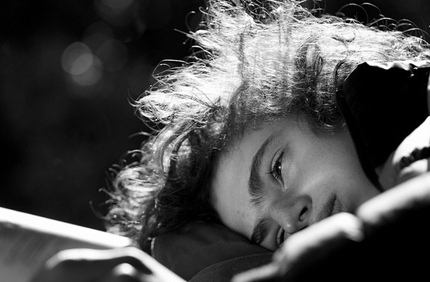




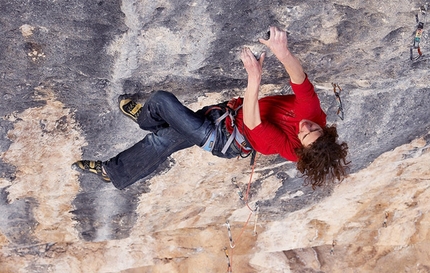

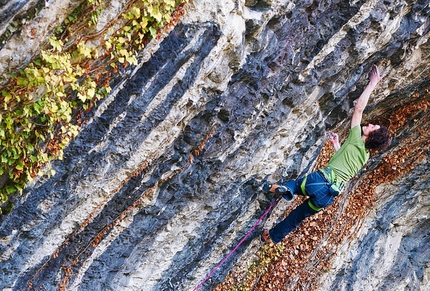
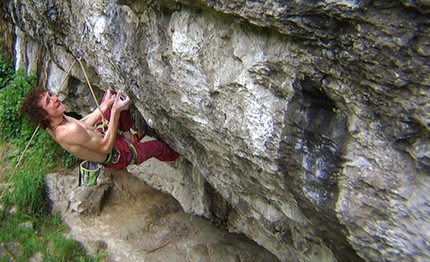



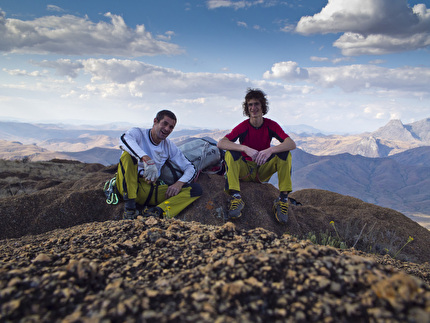
 See all photos
See all photos






















